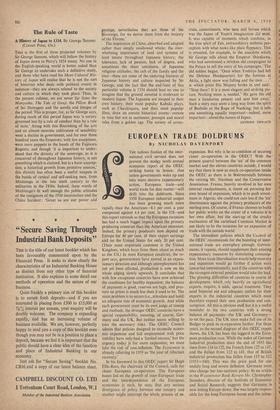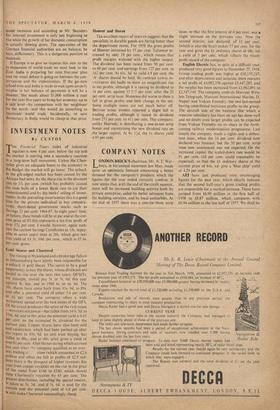DOLDRUMS EUROPEAN TRADE
By NICHOLAS DAVENPORT
THE tedious fustian of the inter- national civil servant does not prevent the stodgy tenth annual economic report of the OEEC striking home its lesSon: that unless governments wake up and take more decisive expansionary action, European trade—and world trade for that matter—will drift into the doldrums. Since 1950 European industrial output has been growing much more rapidly than the American-8.1 per cent. a year compound against 4.4 per cent. in the US—and this report reminds us that the European recession has had a much bigger impact upon the primary producing countries than the American recession. Indeed, the primary producers now depend on Europe for 40 per cent. of their export earnings and on the United States for only 20 per cent. (Their most important customer is the United Kingdom, which buys from them about as much as the US.) In most European countries, the re- port says, governments have moved in an expan- sionary direction and although unemployment has not yet been affected, production is now on the whole edging slowly upwards. It concludes that with few exceptions countries have now achieved the conditions for healthy expansion; the balance of payments is good, reserves are high, and pres- sure on prices is much less than it used to be. The main problem is to secure (i.e., stimulate and hold) an adequate rate of economic growth. And while each government must be its owti judge of timing and methods, the stronger OEEC countries have a special responsibility, meaning, of course, Ger- many and the UK. But neither seems willing to take the necessary risks. The OEEC Council admits that policies designed to reconcile econo- mic expansion and full employment with price stability have only had a 'limited success,' but the urgency today is for more expansion; we must take the risk of cost-inflation. The Economist is already referring to 1959 as 'the year of, reluctant recovery.'
In his foreword to this OEEC report Sir Hugh Ellis-Rees, the chairman of the Council, calls for closer European co-operation. The European boom fed on the growth of inter-European trade and the interdependence of the European economies is such, he says, that any serious divetgence of policy between one country and another might interrupt the whole process of re- expansion. But why is he so confident of securing closer co-operation in the OEEC? With the present quarrel between the 'six' of the common market and the eleven countries outside, I would say that there is now as much co-operation inside the OEEC as there is in Bournemouth between the retiring Mr. Nicolson and the Conservative Association. France, heavily involved in her own internal readjustments, is intent on pursuing her own brand of expansion, which is to push invest- ment in Algeria; she could not care less if the 'six' discriminate against the primary producers of the sterling area. Of course, if France chooses to build her public works on the crater of a volcano it is her own affair, but the start-up of the creaky mechanism of the cartelised Common Market is not likely to be the occasion for an expansion of trade with the outside world.
The immediate policies which' the Council of the OEEC recommends for the boosting of inter- national trade are exemplary enough. Govern- ments, it repeats, should supplement .their existing expansionary measures by stimulating consump- tion. More trade liberalisation would help recovery and expansion would go further if action were concerted internationally, and if'the countries with the strongest external position would take the lead. The pressing difficulties of countries in course of development, which rely heavily on agricultural exports, require, it adds, special treatment. They need financial aid and adequate outlets for their exports in the industrial countries which must therefore expand their own production and con- sumption. All this is obvious stuff but it is a useful reminder to the two countries with a strong balance of payments—the UK and Germany— to set the pace. The UK must make full use of its Budget to push its re-expansion farther. For three years,'as the second diagram of this OEEC report shows, the UK has been the laggard in the Euro- pean production race. While the index of German industrial production since the end of 1955 has risen from 134 to 152, the French from 127 to 147,
and the Italian from 122 to 141, that of British industrial production has fallen from 115 to 112 (1953=100). This was the price paid for our unduly long and severe deflation. Germany must. also change her too cautious policy. In an article in the Westminster Bank Review Mr. Christopher Saunders, director of the Institute of Economic and Social Research, suggests that Germany is now letting Europe down. She was largely respon- sible for the long.European boom and the subse-
quent recession and according to Mr. Saunders her internal investment is only just beginning to rise while the growth of her domestic consumption is actually slowing down. The operations of the German financial authorities are on balance, he says, deflationary. This is a dangerous position to maintain.
If Europe is to give no impetus this year to the re-expansion of world trade we must look to the East. India is preparing her next five-year plan and the usual debate is going on between the con- servatives and the expansionists. If the go-slow school wins and India is made to wait upon an early surplus in her balance of payments it will be a disaster. She needs about $1,0()0 million a year for the next live years to bring her economy up to It safe level-by comparison with her neighbour on the north-and this would do something to reactivate world trade. Incidentally, to save democracy in India would be cheap at that price.



































 Previous page
Previous page